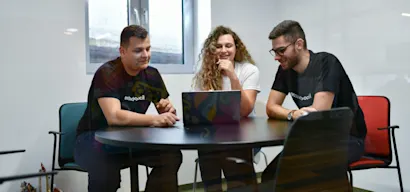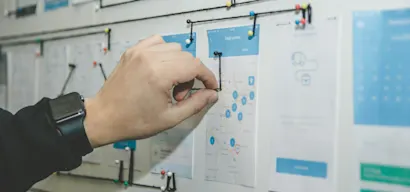Introduction: A new AI support colleague
Kontek, a leading provider of payroll and HR systems in Sweden, was looking to elevate its customer support experience by integrating an AI-powered knowledge assistant directly into its product. Inspired by positive feedback from other Visma companies, they partnered with Unless to bring this vision to life.
The AI was named Sally and introduced as a “new support colleague" that they are trying to teach everything they can to. Having launched in December, Sally is deflecting 2000-2500 tickets per month. While the initial heightened interest was followed by a dip in usage, Kontek managed to turn things around and bring deflected tickets right back up. Responses from Sally have even surpassed the number of tickets handled by the support team.
To understand how they launched and scaled their AI assistant so successfully, we sat down with Malin Krona, Support Team Leader at Kontek. What were some of the strategies implemented by Kontek to ensure this level of success and adoption? A hackathon, a giveaway, and an explainer video. Read on for the details.

Laying the groundwork: Internal engagement
For any AI project to succeed, internal ownership is crucial. It requires commitment and buy-in across the organization, along with the willingness to put in the time to make it work. Here’s how Kontek did it:
Starting things strong
Kontek began its Unless pilot with a hackathon. They were the first (and so far only!) customer of ours to do so. This unusual approach meant that from day one, there were people in the product, clicking around and working on getting things live. They were experimenting with different features and interacting with each other, all the while testing the boundaries of the AI.
While a bit unconventional, this allowed the team to get quick hands-on experience and witness the platform’s capabilities firsthand, generating engagement and curiosity early on.
Company-wide contest
Early on, Kontek organized a company-wide contest that encouraged employee involvement in the naming of their AI. Once they saw the submission “Sally” derived from “salary”, they knew it was the one.
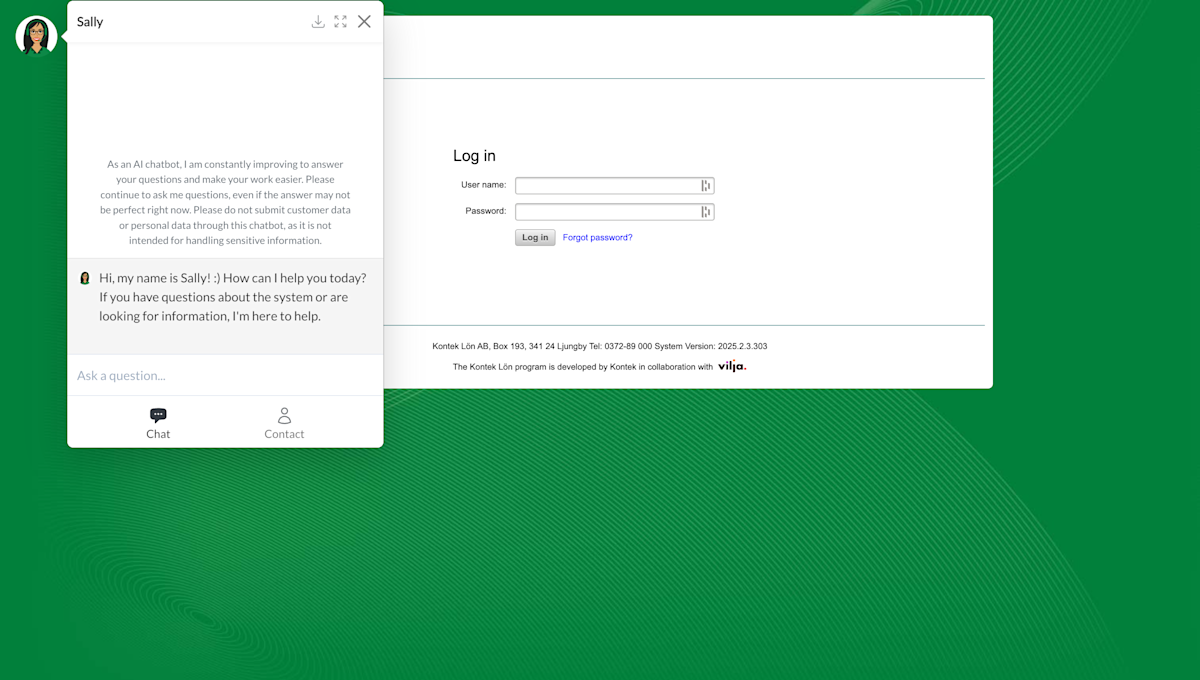
Kontek found a name for its AI, the winner received two tickets to the movies, and Sally gained visibility across the organization (before the launch!). The next step was for the marketing department to design Sally to embody their brand values – approachable, helpful, and smart.
As Malin put it during our interview: “It’s really nice to include everyone because that makes it a lot more fun.”
Driving customer adoption
Once your team is on board and the AI has been tried and tested internally, it is time to go live. What we often see is that customers are curious about the AI at first and start asking all kinds of questions to see how it responds. However, once the initial shine wears off, they might use it less and less. Kontek experienced this firsthand.
The graph above shows a very strong launch with 2500+ AI responses in a month, followed by a rapid decline and plateau in the months after. But that is not the whole story, as Kontek was able to turn things back around.
Onboarding with an explainer video
Kontek noticed that customers initially struggled with asking relevant questions and, at times, only put in a single word instead of a question. To better onboard users, they created a 5-minute instructional video featuring a support colleague explaining how to ask clear, specific questions to Sally.
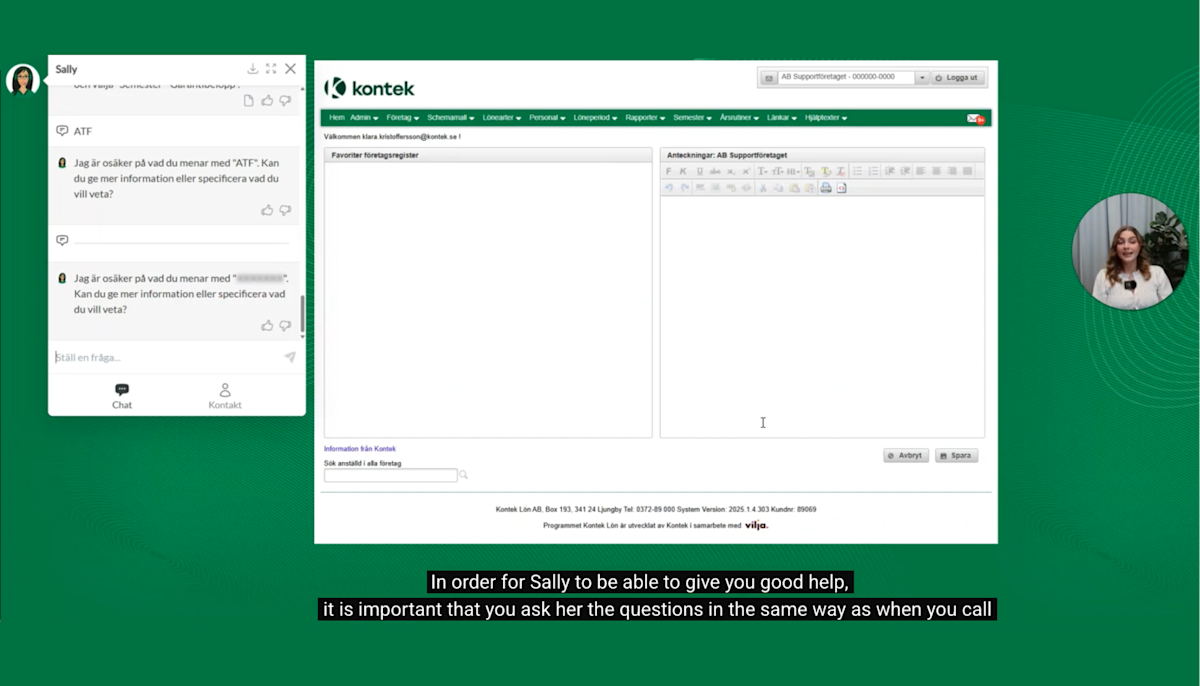
You read that right. The video was a full five minutes. Naturally, we had questions: Are customers watching the video? What’s the watch time? Can you really see the impact?
Malin responded with strong confirmation in the form of a graph that showcased a clear uptick in usage right after the video was released. Malin highlighted the loyalty of Kontek's customer base, which ensured high viewership and adoption of the best practices mentioned in the video.
Qualitative analysis also backed up the data. The team saw a noticeable drop in irrelevant queries and a boost in useful, context-specific ones, proving the impact of thoughtful customer education.
The video included examples of questions Sally can answer really well, along with what was outside its scope. The need to ask questions the way you would when calling support was emphasized. The clearer the question, the better the answer. Otherwise, Sally will ask for clarification, just as a human agent would.
Additionally, a suggestion was made to keep Sally open on the side so that customers can ask their questions the moment they think of them, with little to no friction. This simple tip likely had an impact on increased usage as well.
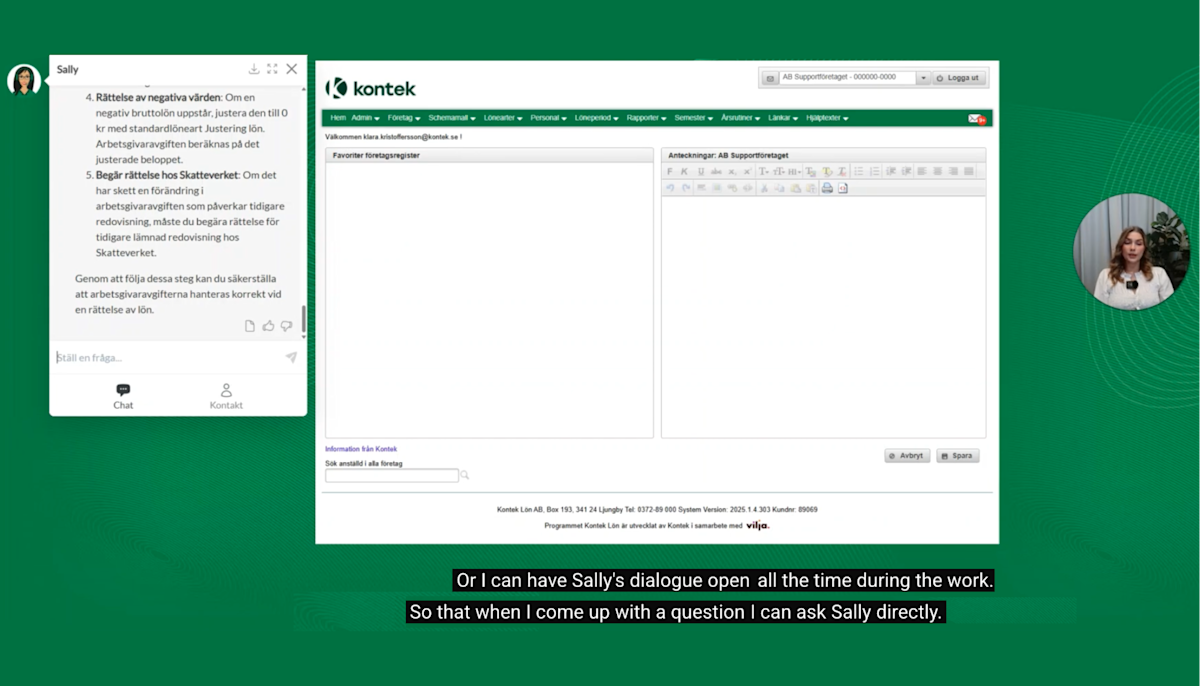
Challenges along the way
Like any AI project, Kontek’s journey wasn’t without its challenges. It required preparation, patience, and continuous iteration. Addressing the challenges early on laid the foundation for Sally’s strong performance today.
Improving the knowledge base
A common blocker for companies implementing an AI assistant is incomplete, outdated, or missing documentation. This can slow down and discourage teams from the get-go, as it can lead to uncertainty and overwhelm about where to start or what to prioritize. That is why Unless has features to help guide customers through every step of the way.
Customers start by adding their training sources, which the system scans for readability, providing a score for each piece of content as well as each section within. This way, customers can get an idea of their document quality and know which sources require their attention first. In the case of Kontek, they already had a substantial knowledge base. However, once they uploaded it as training data to Unless, the AI-readability scores weren’t great.
It’s worth noting that making your content more AI-readable makes information clearer and easier for your audience to understand as well. It simply means that there is a logical structure with clear formatting that is easy to follow. This also means no large chunks of text, but instead breaking up the information into smaller sections.
Once Kontek had an overview of their training data quality, it was time to work on improvements. Here, Unless offers a content optimizer that can automatically improve the structure of your content and thus the quality scores, without changing the actual content within.
In the case of Kontek, since the content was already live for customers, the team created the upgraded versions in a separate environment to avoid disruptions. They have now replaced 70% of the live documentation with the new versions with better readability. They are on track to their eventual goal of replacing all of it.
Unless is really good at guiding you to make the knowledge base better. And that is so important because if you don't get the knowledge base good, the AI will never be good. You get a lot of support in the system (like AI-friendliness scores and warnings) as well as guidance from the Unless team.
Unless also offers insights into which sources are being used the most, which questions can’t be answered by existing training data, recurring quality control reports on AI performance, and more. We are working on expanding this feature set even further.
Unique question landscape
We usually advise our customers to begin their AI implementations by focusing on the most commonly asked questions (i.e., top 10) along with a few curveballs. Making sure these can be answered by the AI is often a good starting point. However, this didn’t apply to Kontek. Unlike many businesses that see the same set of questions repeatedly, Kontek’s customers bring a constant flow of unique and highly specific inquiries.
With 700 different regulations in Sweden depending on what you are working on, we never get the same questions. And even if we do, the answers vary depending on the customer’s industry, so repeat answers are very rare.
During the implementation, we decided against the use of topic segmentation because we didn’t want the customer to have to choose. Yet we think Sally is doing an amazing job and answers so many different questions.
Kontek’s commitment to making its knowledge base AI-friendly, combined with guiding customers to ask clear and specific questions, is what enabled Sally to succeed in such a complex environment. AI isn’t magic. Putting in the work early and consistently pays off in long-term results.
Results and looking ahead
Taking a look at their Unless dashboard, the numbers are striking. Kontek has seen an exceptional 100% ticket deflection rate (only 10 escalations across 8k+ conversations, covering 18.5k questions).
Malin is confident in the numbers and the impact: “When I look through the conversations, I know each of them would’ve become a ticket for the support department otherwise.” That’s certainly remarkable.
Even with spikes in support volume due to internal changes, Sally continues to carry a significant load—especially during busy periods like new regulation rollouts or upcoming system changes.
Malin also mentioned some proactive strategies for the future:
We are facing a September we know will be challenging because we’ll make a big change that’ll impact all of our customers. So right now we are working on preparing Sally for those questions because we know she will be really helpful during a period like that.
Malin’s biggest insight? AI isn’t magic. It requires effort, collaboration, and realistic expectations.
This is going to be hard. Everybody expects AI to just work. We had to be patient, but I’m really glad for that today because in the end we have a really good solution.
We think Sally is doing an amazing job answering so many different questions. And the support from Unless has been great—quick help in Slack, regular check-ins, and continuous product development. We’re excited for what’s ahead.


